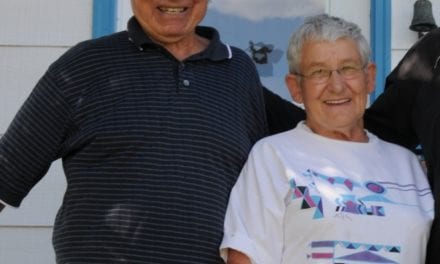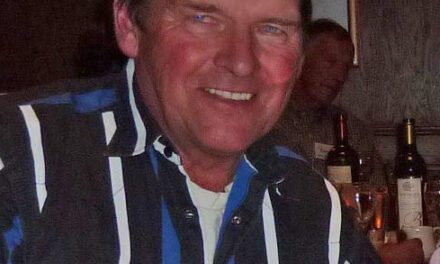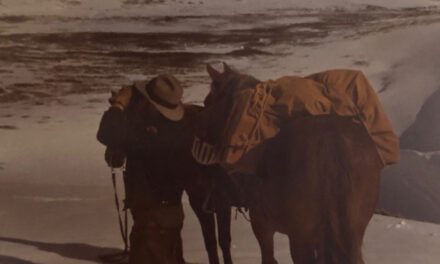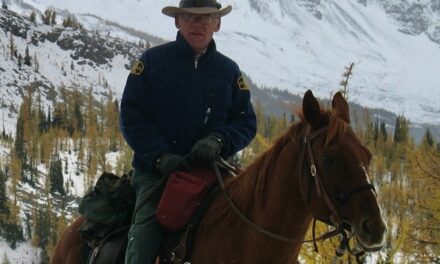Ken: “Debos! Debos!” (laughs)
Deb: Kurt Seel brought me out this old archaic computer from the basement of regional office. It was very old school programing with large floppy discs.
Ken: It still had the black screen with the orange writing.
Deb: Paul Kutzer designed the program for all the horse records from the Calgary office. I converted all the records and created the first actual paid position for the Manager’s wife. I did the administrative work that used to be done out of Calgary.
Perry: The reason we looked at the financial end of the ranch and all the research that was going on out there with the ranch….and that, but we felt that (funding) should not be part of the operational function of the ranch. The ranch was suffering.
Ken: Kurt was in charge of the budget at the time too.
Perry: Right. So that is how the switch over came about. There was a lot of hard feelings in the regional office about that.
Ken: I remember the first year I was there and Cal was after money from Kurt for tools. He said, “Kurt our tools are antiques. We need the proper equipment so that we can do our job properly.
Perry: Once you got an Operational Budget you could spend it the way you saw fit.
Ken: We finally got a new chainsaw and upgraded tools that allowed more efficiency in our work.
Perry: You used to listen to all the radio calls too didn’t you? And you were part of that (radio call) schedule?
Ken: Yeah, at one time….we would call in (to Banff dispatch)….and any wardens that were staying at the bunkhouse too. Deb fed them all. They always came over for supper.
Deb: I cooked for the crews that hauled horses to and from the ranch in the spring and fall.
Rod: The not so silent partner.
Deb: Pretty much…
Ken: The one time Denny came out for horses and Gaby and Gord Dixon came with him, ….and we had a few too many cocktails. And it was the only time that Cal took a drink while we were there. He ended up climbing into Denny’s truck, fell out of it, and skinned his shin all to hell. Went to bed still dressed.
Deb: I had breakfast on and nobody could eat; they were just green and someone said, “Where is Gaby?” And Denny (jokingly) says, “I don’t know but I hope he’s dead!” (everyone laughs)
Rod: So tell us about Gaby? He liked to go out there and ride a little bit didn’t he?
Ken: Yes. Gaby and Darro Stinson used to come out there and stay in the bunkhouse and they’d ride and shoot gophers.
Rod: I used to laugh when Gaby would come up to Jasper. Sometimes he’d go out and Denny would set him up with something. The one time I drove in the yard and I see Gaby with big rowels on the back of his shoes. It must have been about 4” rowels. I thought Good God! Are you going to ride our horses with those?
Deb: Duke was his horse and it seemed like he went everywhere on Duke at a high lope. And then, when he was ready to retire Duke – or maybe when Gaby went into Regional Office and we had since moved to the Bar U – he wanted Duke to come to the Bar U with us….so he asked if we’d take him. We said, “Yes, bring him out.” Duke would pull back and he’d tear the barn down but we said we’d take him. We rode him for five or six years until he was into his late 20s.
Ken: He had developed navicular. (Navicular ‘disease’ – conditions affecting the navicular bone and associated structures in the foot. There are several possible causes of pain in and around the navicular bone. Damage to the navicular bone may occur due to interference with blood supply or trauma to the bone. Damage can occur to the deep flexor tendon, navicular bursa, or navicular ligaments all resulting in pain and lameness. It is usually not found in very young horses. It is often found in horses five years and older.)
Rod: When did you go to the Bar U?
Ken: 2001.
Rod: And you were there how many years?
Deb: Just about 13 years.
Ken: Then Deb got looking over the fence. (She’d say) “It’s past ten years!”
Deb: It is kind of true, actually.
Rod: Tell us about the Bar U. From what I understand you did a terrific job there getting the place back in shape after the previous manager.
Ken: With the Friends of the Bar U being a bunch of crusty old ranchers at the time….you couldn’t say ‘no’ to them all the time. When I asked for approval from Parks Canada on certain issues they’d say, “Well, you can’t do that?” And I’d say, “Well, if I can’t do that tell me what I can do so we can get something done around here.” This made The Friends of the Bar U a lot happier as we were actually moving forward.
Deb: We went to them and said, “How can we help you?” What is it you want from us? They were quite shocked that we came in and said, “We’d like to work together with you and make this partnership work”. There was a terrible amount of animosity between the Friends Association and Parks Canada at the time. We’d gone into a hornets’ nest. So, Ken stick-handled around a lot of issues initially.
Perry: Sylvia was the wrong choice for the Superintendents position.
Deb: That was tough for the Bar U. Like Ken said, these ranchers were very knowledgeable people. They’d been in southern Alberta for a hundred years running ranches and then somebody comes in and is just going to tell them this isn’t how you do it… And they said “No, that is not how it is going to get done.” ‘The Friends’ were a big part of getting the Bar U up and running….they had a lot of influence and a lot of input …so that whole partnership had started to break down.
Ken: They had Hank Palliser there too and he was part of the problem. He wasn’t part of the solution by any means. He was pretty crusty about everything.
Rod: Deb, so tell us about your work at the Bar U.
Deb: When I first went there I wasn’t working for Parks Canada and then I started part time just working on the front desk and eventually worked my way up the ladder.
Ken: It was the same thing again….we were living there and the first time we tried to hire (Deb) they said no.
Deb: The Superintendent of Waterton said it was bad for public perception. Him and I still aren’t friends!
Ken: Public perception to have a husband and wife working at the Bar U….that’s ranching.
Perry: They just didn’t understand the culture. What we wanted to do was have a manager (team) like a husband and wife (on a ranch).
Deb: I had the title of Administrative Assistant. But, at the end of the 13 years, when Ken had already transitioned over to the OH Ranch, for the last 4 months I was the Acting Manager (of the Bar U) and then I moved over here as well. We are used to working together and you bounce ideas off each other. You have good ideas; you have bad ideas, but you work as a team.
Ken: She would tell me as the Manager, “You are full of shit. This isn’t going to work.” And she’d get away with it. (laughs)
Rod: Well, she’s the true manager. (laughs)
Deb: I like working behind the scene.
Rod: You did a terrific job there of setting up all kinds of programs.
Ken: During our time there, The Friends of the Bar U were considered the icon of ‘friends’ associations.
Perry: And also it was more of an experiment… other ‘friends’ did not have the hands-on as much as that in the Bar U and that was a real transition. In Rocky Mountain House they had one that didn’t work I think. There was just no balance as to who had the say. But that one when you guys came in there….that was primarily on an experimental basis. It works well today.
Ken: You’ve got to work with them; quit working against them. They mean well. And if it was not going to fit then let’s find a way to make what they want to do fit instead of saying no you can’t do that.
Rod: Willing volunteers like that are knowledgeable, why wouldn’t you want to work with them?
Ken: And we were great at hiding behind Cultural Resource Management. That was our excuse for everything. Cultural Resource Management says we cannot do that….we hid behind that a lot and it is sad.
Deb: Here’s an interesting tidbit from one of the Friends. One of the ladies that was on the board for quite a few years was Rene Blades. We had brought everything together and had been working closely for quite a few years and she says to me one day as we were celebrating our big Volunteer Appreciation Day…. “Well Deb, you know, things are working pretty good now.” And I said, “Yeah, they really are.” And she said, “I guess we can let Parks Canada back in a little bit eh.” I said, “Oh, okay Rene.” (laughs) But, you know, they understood that we acted as a buffer to help them understand Parks Canada’s role too; because without Parks Canada the place would not exist. So we did act as that buffer and smoothed the waters and said, “Hey, they have a huge place here as well…so do you…it can all work together.”
Rod: You did a great job of working with the community and making the place so much more user friendly for the visitors.
Ken: When we first got to the Bar U there were 32 special events. It seemed like every weekend they were having an event. I said, “You can’t do that. Let’s pick six or seven events that bring in a lot of people and really concentrate on making them premier events.” And that’s what we ended up doing and they are still successful today.
Rod: Of course the program changed a bit over the years because you found the stuff that was successful and others like Aboriginal Days, didn’t work out too well.
Ken: That was a tough one…because our closest reservation was Eden Valley First Nation. Eden Valley is controlled by the Morley reservation. So, we went to talk to Eden Valley, and the Stoney guys would show up and say, “No, no, you should have been talking to us”. And we were dealing with them….and all of a sudden we get a call from the Siksika (Blackfoot First Nation) saying, “Why aren’t we invited? Some of our people worked at the Bar U years ago.” It just got to be a real political nightmare and we just said, “No more.”
Rod: I notice what is going on in Jasper lately. They’ve got every reservation and band in the province involved with Jasper all of a sudden. I can’t understand that as I know for a fact that you know a lot of those people from Sucker Creek and wherever, never had anything to do with Jasper……historically or whatnot.
Deb: My dad (Clint Coleman) used to work with some of the natives.…the Moberlys for one, and a lot of those people. Dad hired those guys and there was a certain group that were part of that Jasper history…but everyone wants their finger in the pie now.
Ken: When we started getting calls from other reservations saying that they should be included in the aboriginal celebrations I just said, “That’s it! How do you control it? You can’t. You lose control and then you are in trouble.
Rod: So after thirteen years you’d kind of had enough.
Ken: You guys know what it is like to be working in tourism. You are in tourism…..and the Bar U is seasonal so you can’t get away in the summer. So your summers are shot.
Deb: And we were very invested in the Bar U. We tend to get a little too invested but it does makes things work well of course…
Ken: Deb helped start the food bank program where we gave all the food (garden produce) to the food bank in High River. Good PR for the community.
Deb: But when this opportunity came up we said, “You know, we’ve lived in some really beautiful places in this province. Actually, you know, Gordy Peyto, he said to us one time when we were working for Mannix once we’d left the Ya Ha….. “He looked around and he said, “So you two, what’s it like to live in a postcard all the time?”



